JEAN-BAPTISTE LULLY ÅUVRES COMPLETES - Olms
JEAN-BAPTISTE LULLY ÅUVRES COMPLETES - Olms
JEAN-BAPTISTE LULLY ÅUVRES COMPLETES - Olms
Create successful ePaper yourself
Turn your PDF publications into a flip-book with our unique Google optimized e-Paper software.
J<br />
ean-Baptiste Lully (1632-<br />
1687) peut être aujourd’hui<br />
considéré comme le plus<br />
grand compositeur français du<br />
XVIIe siècle. De son vivant et longtemps<br />
après sa mort, il fut célèbre<br />
et son œuvre exerça une influence<br />
considérable en Europe auprès de<br />
figures aussi illustres que Purcell,<br />
Bach ou Haendel. Le Florentin<br />
Lulli, venu de bonne heure en<br />
France, entra dès 1653 au service<br />
du futur Roi-Soleil, Louis XIV, dont<br />
il devint rapidement le musicien<br />
favori. Son nom allait être associé<br />
aux fêtes de Versailles et aux comédies-ballets<br />
écrites en collaboration<br />
avec Molière. Par la suite, de<br />
1672 jusqu’à sa mort, il devait<br />
fournir, élaborées pour la plupart<br />
sur des livrets de Quinault, les<br />
partitions de plus d’une quinzaine<br />
d’ouvrages lyriques, faisant de lui<br />
le premier représentant important<br />
de l’opéra français. Cette riche<br />
production, à laquelle doivent être<br />
ajoutés de nombreux ballets et<br />
d’admirables motets (Miserere, Te<br />
Deum), sera pour la première fois<br />
réunie dans une édition critique.<br />
Depuis plusieurs années, on constate<br />
une demande croissante de la<br />
part des interprètes. On remonte<br />
Atys, Phaéton, Armide, et le fameux<br />
Bourgeois gentilhomme continue<br />
d’être souvent représenté. Des<br />
théâtres du monde entier souhaitent<br />
disposer de partitions à la fois<br />
pratiques et musicologiques.<br />
Cette édition pourra y répondre.<br />
Fondée sur l’étude de l’ensemble<br />
des sources conservées, elle obéit<br />
à une démarche scientifique rigoureuse,<br />
faisant appel aux exigences<br />
d’une philologie moderne et à des<br />
spécialistes littéraires pour la révision<br />
des paroles. A côté de partitions<br />
d’orchestre, accompagnées<br />
pour le répertoire scénique de<br />
l’impression du livret, paraîtront<br />
les matériels réservés aux exécutions<br />
et des réductions clavierchant,<br />
tant pour les œuvres dramatiques<br />
que religieuses.<br />
J<br />
ean-Baptiste Lully (1632-<br />
1687) was the most important<br />
French composer of the<br />
17 th century, whose influence in<br />
Europe and on composers such as<br />
Purcell, Bach and Handel was considerable.<br />
With his 15 operas, most<br />
of them based on libretti by Philippe<br />
Quinault, Lully created a<br />
model for French musical theatre.<br />
In 1653, as a dancer and composer,<br />
he entered the service of<br />
Louis XIV, the most powerful monarch<br />
of the time, for whose Court<br />
he wrote ballets de cour and, in<br />
conjunction with Molière, several<br />
comédie-ballets. Of his grands<br />
motets for royal occasions, the<br />
most notable are Miserere, De<br />
profundis, and Te Deum.<br />
The demand for Lully scores and<br />
performance material has increased<br />
considerably in recent<br />
years. The success on many of the<br />
world’s stages of revivals of operas<br />
such as Atys, Roland, Armide, and<br />
of comédie-ballets, including that<br />
most performed of all, Molière’s Le<br />
Bourgeois gentilhomme, has created<br />
a desire for an edition which<br />
meets the requirements of performers<br />
whilst respecting the highest<br />
musicological standards.<br />
The new edition will meet this<br />
need. It will be the first historicalcritical<br />
edition, based on a study of<br />
all surviving sources. As well as full<br />
scores, each of which will include a<br />
printout of the libretto where appropriate,<br />
performance material<br />
and piano scores of the dramatic<br />
works and the sacred music will<br />
also be published. The guidelines<br />
for this edition meet the requirements<br />
of modern philology and of<br />
performance practice, while text<br />
revision will be the responsibility of<br />
established literary experts.<br />
D<br />
er in Florenz geborene<br />
Jean-Baptiste Lully (1632-<br />
1687) ist der bedeutendste<br />
französische Komponist des 17.<br />
Jahrhunderts, dessen Einfluß in<br />
Europa auf Komponisten wie Purcell,<br />
Bach und Händel beträchtlich<br />
war. Mit seinen fünfzehn Opern,<br />
deren meiste Libretti Philippe Quinault<br />
schrieb, schuf er ein bis ins<br />
20. Jahrhundert nachwirkendes<br />
Modell für das französische Musiktheater.<br />
Als Tänzer und Komponist<br />
trat er 1653 in den Dienst Ludwig<br />
des XIV., des mächtigsten Monarchen<br />
der Epoche, für dessen Feste<br />
er Ballets de cour und zusammen<br />
mit Molière seine berühmten Comédies-ballets<br />
schuf. Unter seinen<br />
kirchenmusikalischen Werken ragen<br />
das Miserere, das De profundis und<br />
das Te Deum heraus.<br />
Die Nachfrage nach Lully-<br />
Partituren und nach Aufführungsmaterial<br />
ist in den letzten Jahren<br />
erheblich gewachsen. Die Erfolge<br />
von Aufführungen der Opern (Atys,<br />
Roland, Armide u.a.), der Comédies-Ballets,<br />
darunter das meistgespielte<br />
Werk Molières, Le Bourgeois<br />
gentilhomme, auf vielen Bühnen der<br />
Welt haben den Wunsch nach einer<br />
praktischen und wissenschaftlichen<br />
Ansprüchen genügenden Edition<br />
gezeigt.<br />
Diesem Bedürfnis kommt die neue<br />
Ausgabe entgegen. Es handelt sich<br />
um die erste historisch-kritische<br />
Gesamtausgabe, die auf der Auswertung<br />
sämtlicher überlieferter<br />
Quellen basiert und die praktische<br />
und wissenschaftliche Beschäftigung<br />
mit dem Werk Lullys ermöglichen<br />
soll. Deshalb wird neben der<br />
Orchesterpartitur, die auch einen<br />
Librettodruck enthalten wird, das<br />
Aufführungsmaterial und ein Klavierauszug<br />
für die dramatischen<br />
und kirchenmusikalischen Werke<br />
erscheinen. Die Editionsrichtlinien<br />
werden sowohl den Ansprüchen<br />
moderner Philologie als auch den<br />
Anforderungen der Aufführungspraxis<br />
gerecht. Die Textrevision wird<br />
von ausgewiesenen Literaturwissenschaftlern<br />
durchgeführt.



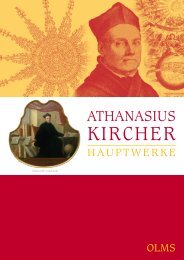

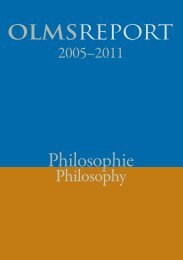

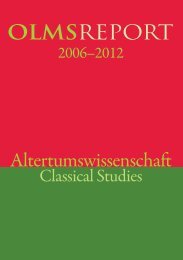

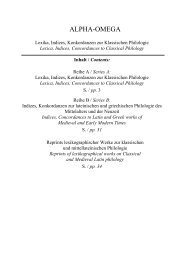
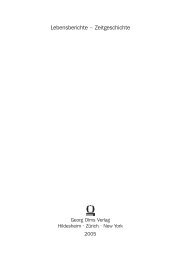
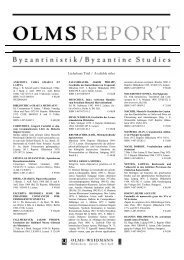
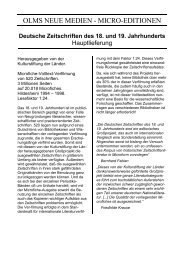
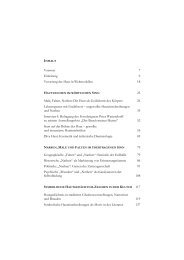
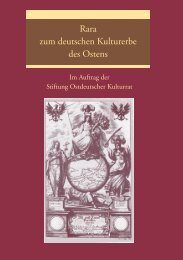

![W[ILHELM], Theatralische Werke in einer Auswahl - Olms](https://img.yumpu.com/6619971/1/184x260/wilhelm-theatralische-werke-in-einer-auswahl-olms.jpg?quality=85)